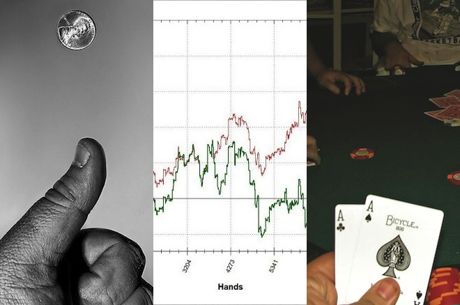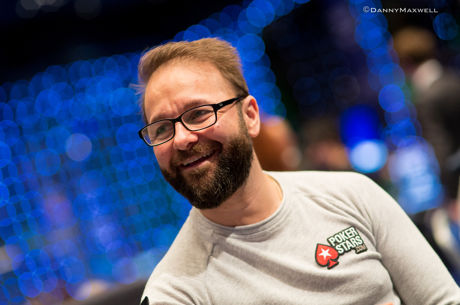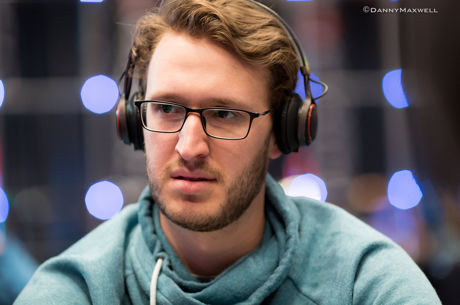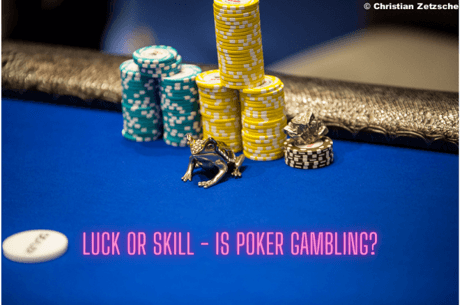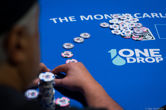"Focus Creates Blindness": The Importance of the Things You Don't See in Poker
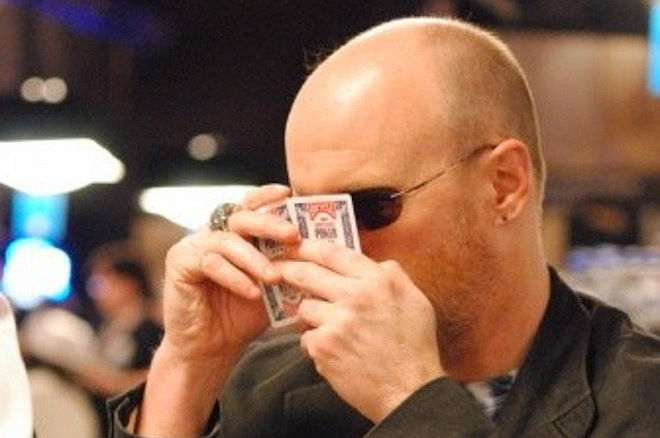
Today's poker lesson consists of just three words. They come from a recent tweet by Teller, of Penn & Teller fame. But before I get to his three words, we need some background.
First, you should know that Teller is not just a fine magician; he is a lifelong student of the art. He has what might be the world's largest collection of rare magic books, and possesses an encyclopedic knowledge of its history.
Moreover, he is deeply interested in the science of human perception, and how magicians use flaws in our perceptual systems to pull off their illusions. He has worked with experimental psychologists, using examples from the world of magic to illuminate how our senses can fool us.
Speaking of, Fool Us is the name of a TV show Penn & Teller have created, currently in its third season. The premise is that magicians come on the show and perform their tricks. If the duo can figure out how the trick was done, the magician is sent off with a nice round of applause, but nothing more.
If, however, the guest manages to fool the expert pair, he or she is invited to perform the trick for Penn & Teller's live audience in their self-named theater at the Rio All-Suites Hotel & Casino — the one where the November Nine will be playing out in just a couple of weeks. As you can imagine, getting to perform at the pair's show would represent an enormous career boost for any working but unknown magician.
On a recent episode, one of the guests was Chris Rose (not the same one who hosts televised poker shows), and he performed a memorable and effective trick.
The heart of the trick is that Rose appears to put a cookie in his mouth, chew it up, swallow, drink some milk, spit out the milk, keep talking, and then — most unexpectedly — remove the intact cookie from his mouth. Teller was on stage with him, watching this from about three feet away, while Penn watched from a front-row seat in the audience. Despite their unobstructed view, rigorous attention, and decades of experience with the standard moves of magicians, neither of them could figure out what had happened, and Rose was declared a winner.
Later, a man named Brayden Hopkins tweeted a series of screen captures from the video with the caption, "How he got the cookie in his mouth":
How he got the cookie in his mouth https://t.co/vs9Rzfs5T7
— Brayden Hopkins (@bunnymagic)
It's quite obvious in retrospect that when Rose appeared to be merely wiping a little milk from his lips with a napkin, he was actually sneaking a second, intact cookie into his mouth, which was the one revealed a few seconds later.
So that's the background for the message from Teller. He retweeted Hopkins, adding this comment:
i'm looking right at it and not seeing it. I'm riveted on what is going to happen with the glasses of milk. Focus… https://t.co/phwmW9KLIs
— Teller (@MrTeller)
There's your three-word poker lesson of the day: "Focus creates blindness."
Expanded a bit, the idea is that when you narrow what you're looking for, you make it more difficult to see other things. How does this relate to poker? Here's one way:
In my most recent outing to a poker room, I watched a hand transpire between two other players. The final board was 5♣8♣4♣A♦7♣.
Player A, having bet the flop and turn, now checked. Player B, who had called the flop and turn, made a pot-sized bet. Player A was visibly agonized. He said, "Why did that last card have to be another club?" But after thinking a while he said, somewhat despondently, "I have to call you. I call."
Player B turned over A♥K♣, for the second-nut flush. Player A, still with obvious disgust, said, "Yeah, I knew it." This was followed, first, by a Very Naughty Word, then by Player A turning his cards face-up to show us his terrible luck. He had flopped a flush, with Q♣6♣ in the hole.
It was a miraculous transformation on the face of Player A when the dealer announced, "Straight flush" and started pushing him the pot. "I won?" he asked in genuine amazement. He then took another look at the board, and only then saw that the 7♣ on the river had filled a gutshot straight-flush draw. He had an absolutely unbeatable hand, and didn't know it until it was too late to make any more money with it.
It's clear what happened: His attention was entirely on first hoping that the river wouldn't be another club, and then, when it was, deciding whether he should call with what he thought was a queen-high flush, against what he correctly inferred was his opponent's bigger flush. Because of that focus, he was blind to the exact rank of his own second club and its tremendous significance, given that particular board.
Bonus lesson: This is another illustration of why it's better to turn your cards face up, even when you're sure you've lost the hand, because every once in a while, you will have misread it. Tabling the cards properly gives the dealer and the other players a chance to recheck who the rightful winner is.
This is a particularly dramatic example, but it's a common phenomenon. I've made similar mistakes myself. I remember once playing a hand in which I raised preflop with 9♥7♥, then flop came A♥6♥4♠. I bet my draw and got two callers. The turn was the 3♣ and I bet again. Both of the other players still came along.
The river was the 5♦. I missed my flush, dammit! Now my only chance to win the pot was to fire the third barrel, so I did. I was chagrined when they both called again. I turned up my nothing hand and said, "I guess I lose."
When the dealer said, "Straight" and pushed me the pot, I was every bit as surprised as Player A was last week. My focus was entirely on either making a flush or bluffing the other players off of their hands. As a result, I had completely overlooked what the Runner-Runner gods had brought me.
To repeat the bonus lesson, with a slight twist: Even if you are bluffing, show your cards, rather than just throwing them away. Sometimes you'll be pleasantly surprised to discover that you were bluffing with the best hand.
There's another way that focus causes blindness. Remember that scene early in Jurassic Park where the uppity kid says that the velociraptor doesn't seem very scary? Dr. Alan Grant, played by Sam Neill, describes what it would have been like to encounter one:
"You get your first look at this 'six-foot turkey' as you enter a clearing," he begins. "He moves like a bird, lightly, bobbing his head. And you keep still because you think that maybe his visual acuity is based on movement like T-Rex — he'll lose you if you don't move. But no, not Velociraptor. You stare at him, and he just stares right back. And that's when the attack comes. Not from the front, but from the side, from the other two raptors you didn't even know were there."
I know that sometimes I've been so intensely concentrating on the player I consider to be the most difficult opponent in a hand that I'm not even consciously aware that there's a third player quietly involved. When that happens, as often as not it's the one I was ignoring who turns out to be the real danger.
Without much effort, you can probably think of examples from your own poker-playing history where you or somebody else was so focused on one thing that something of equal or greater importance escaped notice.
Focus in poker is crucial, of course, but don't let it blind you.
(If you want to watch the Chris Rose cookie trick — and it's worth checking out — it's here on YouTube.)
Robert Woolley lives in Asheville, NC. He spent several years in Las Vegas and chronicled his life in poker on the "Poker Grump" blog.

